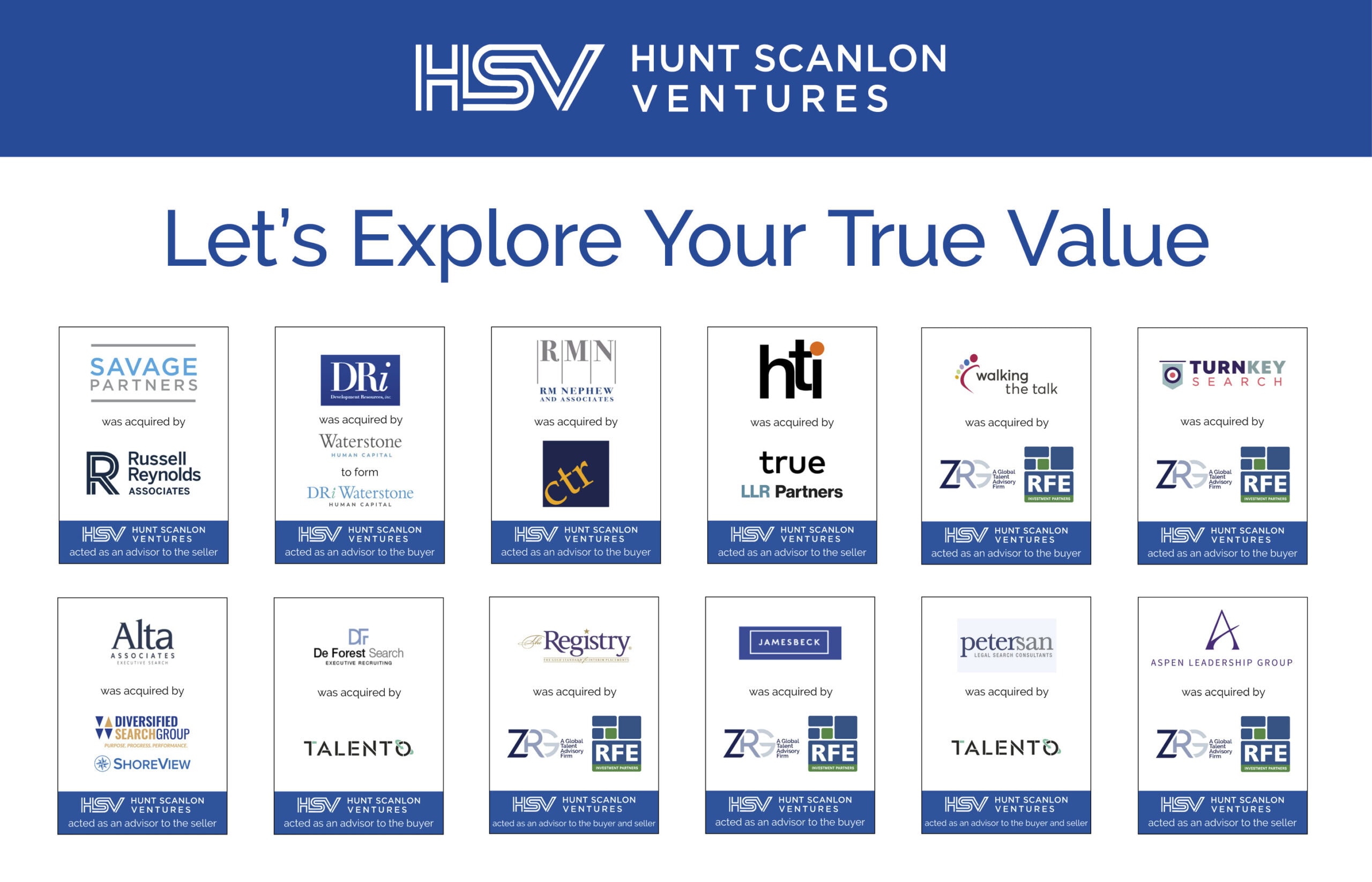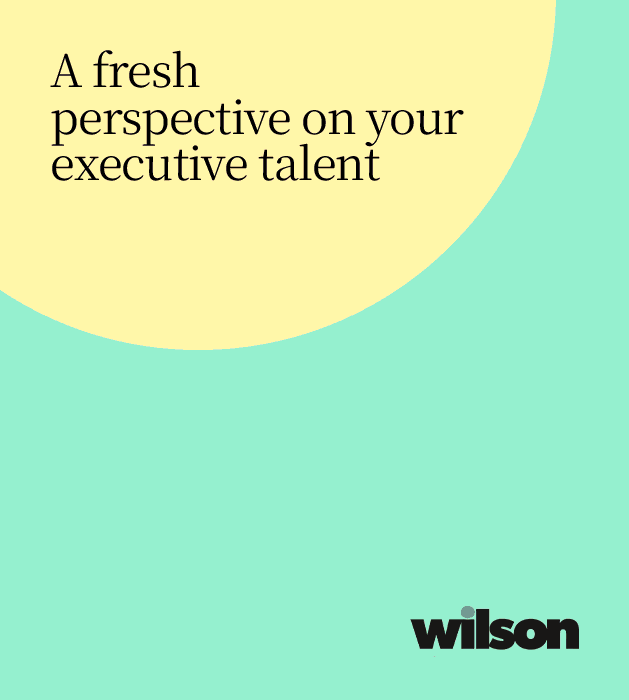In this ExitUp exclusive, editor-in-chief Caleb Edmundson sits down with ZRG CEO Larry Hartmann to discuss his blockbuster acquisition of The Registry, a leading interim solutions provider and ZRG’s largest purchase to date.
Larry Hartmann is a seasoned veteran of the people business. As the chief executive of ZRG, he leads one of the fastest growing, global talent management hubs in the human capital sector.
It wasn’t always this way. Larry founded ZRG 24 years ago on the core principle of building a better recruiting platform. Simple enough. Today, that vision has extended to a $230 million data-driven suite of talent and consulting offerings, including culture transformation, leadership assessment, executive coaching, strategic communications, RPO, and interim solutions. The firm is a perennial leader in Hunt Scanlon’s Top 10 rankings.
ZRG’s expansion effort, according to rivals, has been swift and strategic. Less than a year ago, ZRG secured a secondary equity investment from a consortium of new and existing institutional investors led by Timber Bay Partners. It has used that capital and an expanded credit facility to continue an acquisition journey that has produced 11 deals over the past four years.
Worth the Wait
ZRG’s acquisition of The Registry three months ago was its most complicated and drawn-out transaction to date. Through a unique membership-based network, The Registry has helped over 500 colleges and universities find temporary – or interim – leaders during times of leadership transition. In its category, The Registry stands alone with virtually no competition and insatiable demand for its services.
“Calls for interim leaders are gaining wider traction as demographics shift and talent needs change,” said Scott A. Scanlon, CEO of Hunt Scanlon Ventures based in Greenwich, Conn., which facilitated the transaction and served as a strategic advisor to both firms. “Our belief is the next war for talent will take place among the gig work force. That is the opportunity we sold Larry on, and he and his senior management team are now poised to capitalize on that,” he noted.
In the following interview, Larry Hartmann takes us inside the deal – ZRG’s largest transaction to date. He reflects on how the deal came together, the challenges of aligning around the unique needs of founders, the importance of setting realistic expectations, the critical role of integration, why empathy matters in M&A, and the role perseverance and patience played in bringing the deal to a successful conclusion.
Larry, as you look back on this deal what stands out?
This deal reminds me that M&A takes patience and a long-term view. The Registry transaction did not happen overnight. It took considerable time for us, as buyers, to get to know the business and for the business to get to know us. In every deal I have been involved in I find that it is critical that the buyer and seller are, first and foremost, aligned strategically. We did that and Hunt Scanlon played a big role in maneuvering both sides to the middle. We all spent considerable time aligning around the deal structure and that was critical as we tried to meet the unique needs of The Registry’s founders.
Is it challenging to work with founders?
Founders are tough negotiators. They are transitioning something they have, in many cases, spent years building. Selling a business can be like handing off a baby to a stranger. So, yes, we spent considerable time understanding their needs, their concerns, and their desires. Sometimes it can take a year or two to find just the right strategic alignment between buyer and seller. This deal took us on a slightly longer journey than that. That is why patience and taking the long view are so critical in the M&A process. But here we are, the journey has ended, both sides are content, and we now have what we believe is the prized asset in higher education interim solutions. We are the No. 1 player. From that perspective, The Registry ‘deal process’ validates my belief that when the right opportunity is on the line, you stick with the process no matter the timeline.
“Founders are tough negotiators. They are transitioning something they have, in many cases, spent years building.”
What was your initial reaction when Scott brought you this deal?
Like most of the deals that Hunt Scanlon brings to us, this one was personally introduced by Scott to me. Hunt Scanlon has built out a terrific team of M&A advisors – a young, capable, and smart group, and of course ZRG has the same capability on our end. Our teams work so well together. Yet here we are, the two founders of our respective firms who have enjoyed a relationship that goes back a decade or two. That’s how deals get done. Friendship, mutual trust. Nobody brings as much excitement to the deal process as Scott. When he believes in an asset, he sells hard. That’s what happened in this situation. He knew The Registry founders well and he knew their business, inside out. So, he had both sides locked in. But he didn’t have to sell me too hard on this one. It was an incredible business; it almost sounded too good to be true. It was a unique model. It was a marketing machine. Not a day went by without three or four unsolicited inquiries coming into The Registry’s HQ outside of Boston. It was magic.
When a deal comes your way that seems too good to be true, do you approach it with more caution?
100% yes! What’s underneath the hood? What’s the issue that we’re not seeing? Is the founder or management team going to be realistic about the valuation? Too many founders believe their service businesses are worth tech multiples and they think 10 times revenue is reasonable. That said, when a business is truly special, there can be a reset in valuation expectations. That can be a big part of what takes time to work through in an M&A process. For a buyer, time can be your best friend.
What advice would you give to buyers and sellers who find themselves in a drawn-out process?
If you’re the buyer my advice would be to have a big pipeline of opportunities, because you don’t know which ones are going to come through to a successful completion. You can’t fall in love with one single deal, because you don’t know how it’s going to shake out. If you’re the seller, it can be easy to get exhausted and burned out during the M&A process. You need good advisors at your side as you take the journey. Selling your business is a time-consuming process. It is emotional. It has many ups and downs. I’ve been on both sides of this process. I founded a business in the financial services space that I successfully sold to American Express before I started ZRG and it was a very tiring, but enlightening, experience for me to go through. If you’re the seller, you need to be realistic so that you don’t spin your wheels and burn out. If you’re a buyer, you’ve got to have patience and discipline.
“When a business is truly special, there can be a reset in valuation expectations. That can be a big part of what takes time to work through in an M&A process. For a buyer, time can be your best friend.”
Larry, elaborate more on maintaining rationality in the deal process.
It is critical to stay disciplined and to keep your vision clear. You cannot let your emotions cloud your view in terms of price, structure, and fit. We talk to a lot of companies and then do three deals a year, but we pride ourselves on our ability to land on the RIGHT three. We may talk to 30 founders in a year to get to those three. You have to be out in the market to find the deals worth doing, and you need to stay objective while you’re looking, always keeping your initial hypothesis in view and stay true to your acquisition fundamentals.
Does having experience on both sides of the deal process help with your emotional approach to it?
Absolutely. I get what it is to sell a business. I understand the emotions that owners are going through in this process. I think they see that and find some comfort in it. It lets them know they’re joining a firm with an entrepreneurial founder who has been through the process and knows what it’s like. If you talk to any one of the 10 founders whose companies we’ve acquired, they tend to feel good about the process, but they also feel comfortable with the culture they’re folding into. I feel that being able to empathize with the emotions of the people on the other side of the table makes us a better buyer and a better partner through this process.
“Being able to empathize with the emotions of the people on the other side of the table makes us a better buyer and a better partner through this process.”
What was the most challenging aspect of The Registry deal? And how did you overcome it?
Patience was critically important on The Registry deal. From start to finish this was a complicated process. It took a while to align our structure to the owner’s structure. We had to have the patience to allow the founders to explore what they thought was reasonable while considering what we felt was reasonable. In many ways, that allowed both of us to stick to our convictions while understanding where the other side was coming from. It also allowed us to build a trusted relationship over time and that is what brought a positive resolution for both sides.
“We take our time on integration to make sure we don’t screw up what we’ve bought. If you change things quickly, if you try to turn something you’ve bought into something different, you can destroy the value of what’s there along the way. I’ve seen this mistake time and time again in M&A.”
What element of this process did you find to be the most rewarding or fulfilling?
We did a lot of research on The Registry as part of our due diligence process. Our team spends a lot of time on that. We utilized an outside research firm, we did lots of market research, and we surveyed customers. We knew The Registry had a sterling reputation in the market, but as we did our homework along the way it became increasingly clear that this firm was, hands down, the best-known brand in the higher education interim solutions space. The feedback was consistently telling us how incredible The Registry was, how exceptional its management team was, and that this deal would be a total grand slam for us. Going into a process you have your assumptions but having them validated by the market is really fulfilling.
When you’re hearing nothing but good things about your target, is it ever tempting to lose your objectivity, to lose your discipline?
I’m confident in my ability to maintain objectivity, but this was a deal that was objectively exciting. Not just because of the business The Registry represents, but because of the synergies it provides us. This deal is going to unlock a whole sector that will feed other aspects of our business. As the No. 1 interim solutions business in higher education, The Registry will feed our executive search business alongside everything else that we do. This deal gives us a massive lift in the higher education vertical that will help us expand our consulting arm alongside our RPO business which focuses on volume hiring. Think about the synergies we also picked up with our sports recruiting franchise, which is arguably the best in the search business. Hunt Scanlon helped us close an M&A deal in that space a few years ago and Scott outlined that synergy to us when he first brought us The Registry to look at three years ago.
Do these synergies help to smooth the integration process?
On one level, yes, but we take our time on integration to make sure we don’t screw up what we’ve bought. If you change things quickly, if you try to turn something you’ve bought into something different, you can destroy the value of what’s there along the way. I’ve seen this mistake time and time again in M&A. If we think we have a valuable business we’re going to slowly, over time, look at unlocking potential synergies. I think for us full integration on this deal is a two- or three-year journey. Our first priority is to not harm the asset that we’ve just acquired. We then will be looking to unlock its potential moving forward. That’s the approach we’ve taken with our sports business, where we’ve seen revenues quadruple. We feel confident in that model. It has worked well for us.
What specific synergies did you see in this deal?
The synergies of this acquisition to the rest of our business are just so compelling. We have, arguably, the No. 1 market share player in college sports recruiting with our recent Turnkey Search acquisition. We also acquired Helbling & Associates, a 30-year-old recruiting firm that specializes in real estate roles for higher education institutions, and they also hold the No. 1 market share position in their niche function. So, folding in The Registry gave us three distinct No. 1 players in higher education. In short order, ZRG’s core education business now produces over $50 million a year for us. Our immediate aspiration is to integrate these niche capabilities, expand and grow our core academic search platform, and build this up to a $100 million business within our company. Unlocking that intrinsic value is a priority for us.
Article By

Caleb Edmundson
Caleb A. Edmundson is Editor-in-Chief of ExitUp, the investment blog from Hunt Scanlon Ventures designed for professionals across the human capital M&A sector. Caleb serves as an Associate for Hunt Scanlon Ventures, providing robust industry research to support the firm’s investment group. Connect with Caleb.






